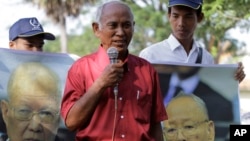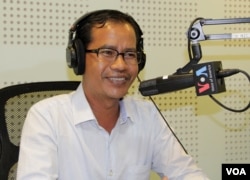Forty years after the Khmer Rouge rose to power, a wide gap in knowledge remains between those who survived the horrors of the regime and those who were born later.
However, community-level public education forums can provide a meaningful platform to encourage intergenerational discussions, Pheng Pong-Rasy, team leader of the Genocide Education Project at the Documentation Center of Cambodia, said.
“In the family, intergenerational dialogue happens between parents and children,” he told the radio call-in show “New Voices.” “At public forums, dialogue happens between community elders, teachers and the youth.”
Although decades have passed since the demise of the Khmer Rouge, virtually no mechanisms exist to help people share their experiences. Many younger Cambodians have difficulty understanding the tragic history of the country and the trauma experienced by their parents.
Pheng Pong-Rasy said public forums can bridge the communication gap in a professional way. The forums are informal events that compliment family discussions and official high school textbooks, which have been introduced in 2011, he said.
Kakada, a “New Voices” caller from Battambang province, said he had never attended such a forum, but he said that he is often asked by his younger relatives about his experience during the Khmer Rouge.
Pheng Pong-Rasy said public forums are conducted at a larger level, educating the young and acting as catharsis for regime survivors.
“It’s medicine for post-traumatic stress disorder,” he said, addressing the caller. “For someone like you, who lived through the Khmer Rouge, when you share those experiences with your children, and your children ask you to go further back [in memory], that will make you feel relief, because your stories have been heard by your children, who care to listen.”
That can help decrease the sense of isolation felt by many survivors, he added.
The Documentation Center has conducted 28 such forums since 2010, across the country. Students as young as those in grade seven have attended, Pheng Pong-Rasy said, and they often ask good questions.
Pheng Pong-Rasy says the Center plans to do 12 public forums this year and will start an online fundraising campaign at the end of May to support the project.
You can contribute to the Kickstarter project here.
-----
Note: As part of the New Voices radio show's requirement for guests to suggest a good reading material for audience, Pheng Pong-Rasy suggested “The Leader's Guide to Influence: How to Use Soft Skills to Get Hard Results” by authors Mike Brent and Fiona Dent. For success tips he suggests “listen more than you speak” [be a good listener].








